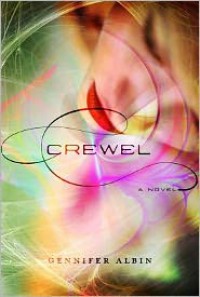Crewel

Read This Review & More Like It AtAgeless Pages Reviews
Let me start with the biggest flaw in Crewel: it doesn’t live up to its potential.
I’ve been watching Crewel with breathless anticipation since I saw the cover on Cuddlebuggery. When the ARC went up on Netgalley, I clicked that request SO. HARD. And then I had to wait two weeks while all my friends got theirs and posted loving, 5 star reviews. When Macmillan finally accepted my request, I did a very enthusiastic happy dance that may have scarred my mail clerk forever. What I’m saying is I wanted Crewel to succeed more than any book in a long time. And I was disappointed, like your mom when you bring home a C in a subject you could ace if you’d just apply yourself.
This book was a readalong with Jessie, who as always was fabulous and brought up great discussion points. In an exchange near the end of the book, I joked that I still didn’t know if the world of Crewel took place inside a key à la Incarceron. (Note, yes that’s both a minor spoiler and not for Incarceron, because they’re not actually in the keys. Please just go with me here.) And then it hit me. I feel the same way about Crewel that I felt about Incarceron.
Both are acclaimed YA novels with massively original worlds that I felt fell down in building them. Both have main characters that can be difficult to like, (though Adelice is miles better than Claudia.) Both had bright points but ultimately left me underwhelmed. And both were incredibly difficult to review.
Crewel begins, like so many dystopians, on the day the main character undergoes some sort of ceremony to become an adult. In Arras, that would be the Spinster testing to see if young girls can see and manipulate the weave of time and matter. Adelice has all the skills, but her parents have secretly trained her for years to fail the test. They’re distrustful of the Coventry and the life of the Spinsters, so they teach her to be graceless and clumsy, and to pretend not to see the threads. Everything goes well during the first rounds of testing, but on the last day Adelice slips and weaves.
I would like to take a moment and ask what the hell being graceless has to do with weaving? It’s established that Spinsters can only see the weave through special looms that the children have never been exposed to until testing. So this isn’t a case of “untrained magic users are unconsciously using their gifts to be stronger/faster/better.” Yet Adelice’s classmates are certain she can’t be a Spinster because she’s awkward and clumsy. Is it supposed show that she’ll fumble the threads? Because I trip over a lot of stuff, but my hands are steady. I find questions like this really frustrating and take me out of the world.
From testing, Adelice is taken to the Coventry against her will and we’re introduced to the books’ two main antagonists, Cormac Patton, Coventry Ambassador for the Guild of Twelve, (that’s a lot of words to say his job is cryptic one sided phone calls and showing up to fuck with Adelice,) and Maela, a sadistic Spinster in charge of training Eligibles. Cormac at least gets some interesting lines and a bit of characterization. Maela literally kills people for no reason and apparently the Guild thinks that’s hunky dory. We also meet the Love Triangle, Erik and Jost. Erik is Maela’s personal assistant that she’s banging on the side and Jost is the head vallet.Their descriptions and roles are basically interchangeable, except Erik is the slightly dangerous one and Jost is the slightly sweeter one.
At this point, I can forgive Crewel for being a bit derivative and flimsy in the world building, because we finally get to what I’ve been waiting for. Adelice’s first weaving lesson is a nugget of brilliance, completely original and enticing and...over in about 8 pages. But that’s OK, we only have to wait one chapter for some more weaving. And then political intrigue for 50 pages. Then some weaving. Then a ball! Then angst, angst, angst. But then some weaving! It turns into a roller coaster ride, just when the plot finally starts to feel fresh and we learn a tidbit of Arras’ history, down we go to boring love triangle drama. Every time I’d want to stop, we’d finally get a confrontation. Sadly, the highs aren’t high enough to carry the tension and excitement through the low times. I’ve said books are uneven before, but this one takes the cake.
Without divulging too much, by the time we arrive at the conclusion, there are still a lot of hanging threads and flat out holes. Someone Adelice loves is believed dead, but one of the love interests reveals this is probably not the case. Adelice is so overjoyed that she spontaneously kisses him and rushes off to do...nothing. It’s never mentioned again. She never looks for this person. They stop existing as soon as the scene is over. And then there’s the mental gymnastics she has to do at the end of the novel to learn the connection between Erik and Jost. It may be the most ridiculous logic jump in the history of fiction.
But despite all of this, I can’t call Crewel bad. I still think the premise has a lot to offer, particularly in the sequels. I enjoyed large parts of the book, mostly pertaining to Loricel the Creweler. And I do want to give special props for being the only YA dystopian I’ve read that mentions and deals with the fact that sometimes people are gay. How they handled that, well that goes back in the negative column, but I appreciate the effort. For such an original premise, scoring this book average is the meanest thing I can do, but that’s how it shakes out.





